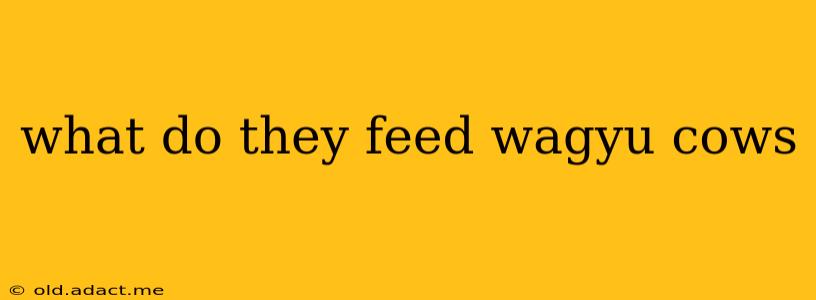Wagyu beef's unparalleled marbling and tenderness are not accidental; they're the result of meticulous breeding and, crucially, a carefully crafted diet. Understanding what Wagyu cows eat is key to appreciating the superior quality of the meat. While the exact recipes vary by farm and region, some commonalities define the Wagyu diet.
What is the Main Component of a Wagyu Cow's Diet?
The foundation of a Wagyu cow's diet is high-quality forage. This typically includes grasses like orchard grass, ryegrass, and timothy hay, selected for their nutrient density and palatability. The quality of the forage directly impacts the beef's flavor and texture. Farmers often supplement this with legumes like alfalfa, providing additional protein and essential nutrients. The emphasis is always on providing the most nutritious and digestible forage possible.
Do They Feed Wagyu Cows Grain?
Yes, grain plays a significant role in the Wagyu diet, particularly during the finishing stage. This is when the cows are fattened up for slaughter. The grains used are carefully chosen for their ability to promote marbling. Common choices include:
- Corn: A staple in many Wagyu diets due to its high energy content.
- Barley: Offers a good balance of energy and fiber.
- Sorghum: A drought-tolerant option often used in warmer climates.
- Oats: Provides a source of fiber and essential nutrients.
The proportion of grain in the diet is carefully controlled to optimize marbling without compromising the meat's flavor or texture. It's a delicate balance – too much grain can lead to excessive fat and a less desirable taste.
What About Supplements?
Beyond forage and grain, Wagyu cows often receive nutritional supplements to ensure they receive a complete and balanced diet. These may include:
- Protein supplements: To support muscle growth and development.
- Mineral supplements: To ensure adequate intake of essential minerals like calcium, phosphorus, and zinc.
- Vitamin supplements: To provide crucial vitamins for overall health and well-being.
The specific supplements used depend on the individual cow's needs and the overall nutritional profile of the forage and grain.
What are the Differences in Wagyu Diets?
There is considerable variation in Wagyu diets across farms and regions. Some farmers might emphasize a grass-fed approach, while others incorporate a higher proportion of grain. The specific mix of grains and supplements can also vary significantly, reflecting the farmer's philosophy and the local availability of feedstuffs. This diversity contributes to the wide range of flavors and textures found in Wagyu beef.
How Does Diet Affect the Final Product?
The diet profoundly affects the final product. A diet rich in high-quality forage and carefully balanced grain contributes to the exquisite marbling, tenderness, and rich flavor that defines Wagyu beef. The meticulous attention to diet, coupled with careful breeding practices, is what sets Wagyu apart from other beef breeds.
What Makes Wagyu Different from Other Beef Cattle Diets?
The difference lies in the emphasis on high-quality ingredients and precise feed management. While other beef cattle might receive a more basic diet, Wagyu cows are often fed a more refined and balanced diet tailored to maximize marbling and flavor development. The attention to detail in Wagyu feeding reflects the premium price commanded by the beef.
This careful attention to diet is a crucial element in the production of Wagyu beef, ensuring the exceptional quality and taste that consumers worldwide appreciate. The dedication to providing the best possible nutrition ultimately results in one of the world's most prized and luxurious beef experiences.
